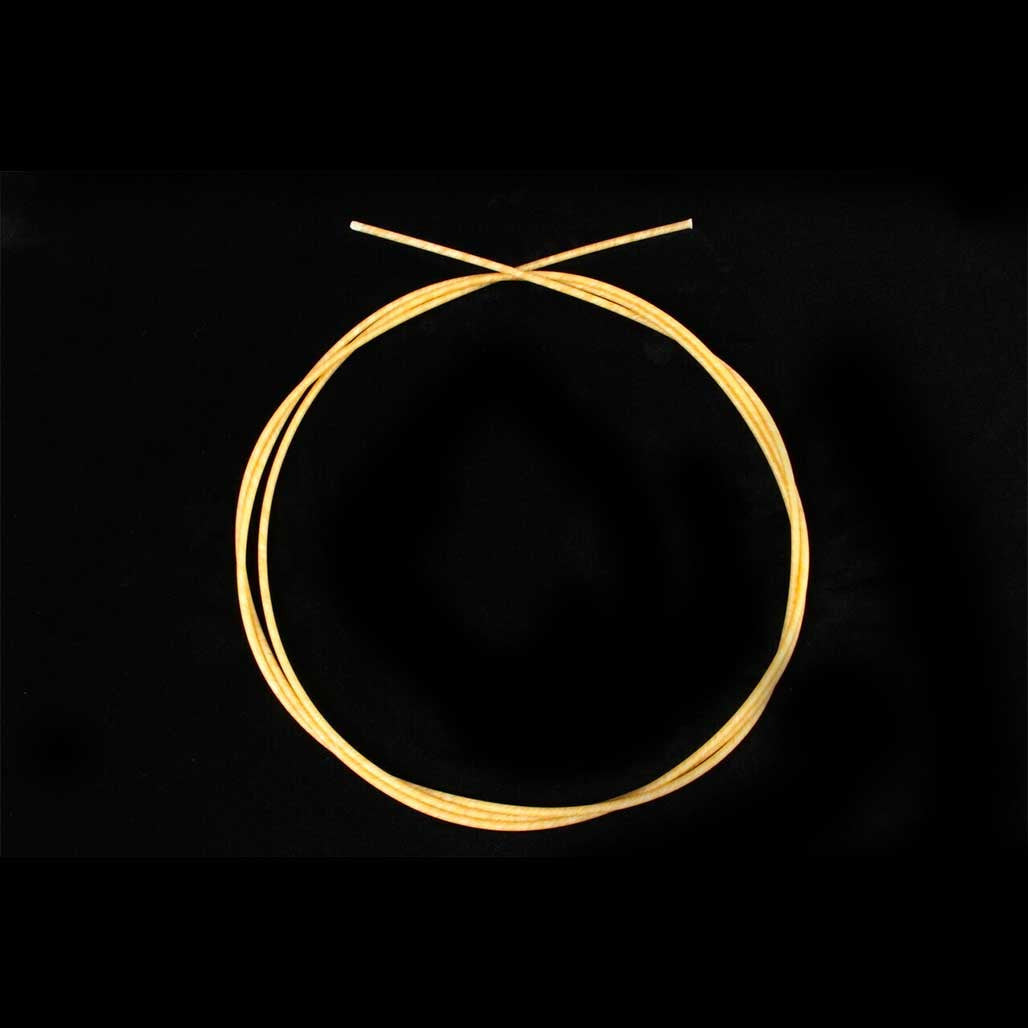Description
The solo gauges are assuming a pitch of a=440.
| Solo Bass e-2 Lyon Gauges | |
| Light | 2.56mm |
| Light+ | 2.58mm |
| Medium | 2.60mm |
| Medium+ | 2.62mm |
| Heavy | 2.64mm |
| Heavy+ | 2.66mm |
This is a single-length (80", 200cm), single twist, Lyon-style string made with beef serosa available with either a natural or varnish finish.
Plain gut strings are available with a natural or varnish finish. Natural strings are hand-rubbed with a light oil. Varnished strings have three coats of finish before being hand polished with the oil. There is an additional charge for varnished strings.
In order to secure the bass string in the tailpiece, Gamut Music has developed the use of a leather washer as a stop. A washer is an option you can choose if you do not want to tie a knot at the end of the string as a securing feature. Bass strings are quite thick and sometimes stiff, and tying a knot can be complex and inelegant. The leather washer is a reliable and secure solution to the problem of securing the string at the tailpiece.
A new option of nylon winding has been added to the contrabass Lyon strings. Due to the popularity of the Red Diamond wound G-1 and D-2 strings, we have decided to add this option to the regular Academie line of bass strings. This nylon makes the strings more durable, especially if you live in a high humidity environment or have a acidic perspiration. The nylon covering creates a protective layer that stops the gut fibers from becoming loose, causing the gut to break down and become false, thereby adding life to the string.
Please note: The nylon adds about .30mm to the diameter of the string, resulting in effectively adding about .09mm of gut weight to the string, resulting in an amount of about one gauge size. So, if you specifically wanted the tension of the medium gauged string with the nylon wrapping, you should order the light+ gauge with the nylon option. This will give you the tension of the plain gut, medium gauged string.
This type of gut is named after the town in France which was famous for a particular type of flexible gut string. From the 16th century these strings were recommended as being some of the best strings for basses. Our reproduction of this string is made from gut specially processed in our workshop to be soft and responsive. The gut is twisted in one direction to a high twist for the optimum combination of durability and flexibility. The Lyon should be preferred when a little extra stiffness is required under the bow or finger. This type of string is characterized by a tight and visible twist. The color tends toward opaque light to medium yellow. The Lyon-style of gut string is a high twist, single spin construction that offers a tone that is full and warm with a powerful fundamental and complex, pleasing upper partials.
#
Hand-made in the USA by Gamut Music, Inc., a leader in the revival of early music strings and instruments. Gut strings are not intended to be used with fine tuners or string adjusters, and those devices should be removed before installing the gut string on the instrument.
All Gamut Academie strings (pure gut and gut/metal-wound) are made with beef serosa unless they specifically say "Sheep Gut." All pure gut Tricolore violin and viola strings are made with sheep gut; gut/metal-wound Tricolore and all Red Diamond strings are made with beef serosa.
Gamut gut string gauges are approximate (≈) diameter. Meaning, that while a ≈0.60mm string is polished in the workshop to a diameter of 0.60mm, changes in ambient humidity, temperature, shipping, and storage conditions can cause to string to expand or contract slightly.
Gimped gut strings and custom gauged equal tension strings are gauged with the equivalent-gauge (=) system. This means that the gauge listed, such as =1.50mm, indicates that the string is approximately equal in weight to a plain gut string of that diameter. Of course, because the wire is much heavier than gut, the string will be much thinner than a plain gut string.
More information about Gamut gut strings, string types, gauges, and string tensions can be found on our FAQ/Articles page. Not finding an answer to your question? Please contact us directly: support@gamutmusic.com.



